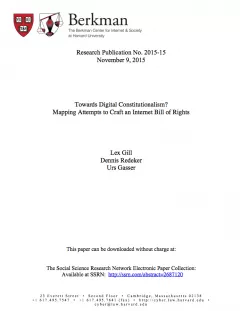
Towards Digital Constitutionalism? Mapping Attempts to Craft an Internet Bill of Rights
Abstract: The idea of an “Internet Bill of Rights” is by no means a new one: in fact, serious efforts to draft such a document can be traced at least as far back as the mid-1990s. Though the form, function and scope of such initiatives has evolved, the concept has had remarkable staying power, and now—two full decades later—principles which were once radically aspirational have begun to crystallize into law. In this paper, we propose a unified term to describe these efforts using the umbrella of “digital constitutionalism” and conduct an analysis of thirty initiatives spanning from 1999 to 2015. These initiatives have great differences, and range from advocacy statements to official positions of intergovernmental organizations to proposed legislation. However, in their own way, they are each engaged in the same conversation, seeking to advance a relatively comprehensive set of rights, principles, and governance norms for the Internet, and are usefully understood as part of a broader proto-constitutional discourse. While this paper does not attempt to capture every facet of this complex political behavior, we hope to offer a preliminary map of the landscape, provide a comparative examination of these diverse efforts toward digital constitutionalism, and—most importantly—provoke new questions for further research and study. The paper proceeds in four parts, beginning with a preliminary definition for the concept of digital constitutionalism and a summary of our research methodology. Second, we present our core observations related to the full range of substantive rights, principles and themes proposed by these initiatives. Third, we build on that analysis to explore their perceived targets, the key actors and deliberative processes which have informed their character, and the changes in their substantive content over time. Finally, we look forward, identifying future directions for research in this rapidly changing policy arena and for the broader Internet governance community.
You might also like
- communityThe Digital Panopticon Nightmare
- communityComparing Apples to Oranges
- communityCyberbullying linked to PTSD in children


